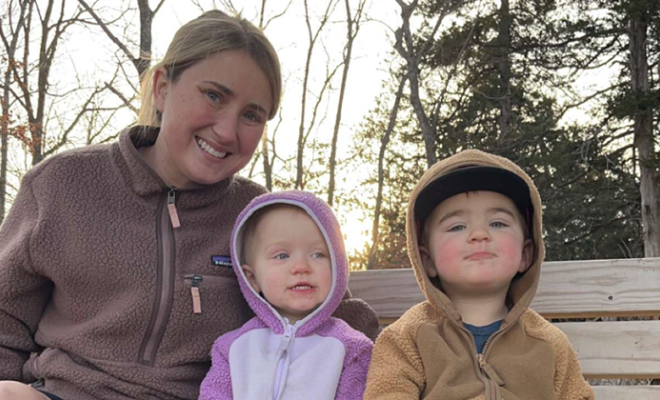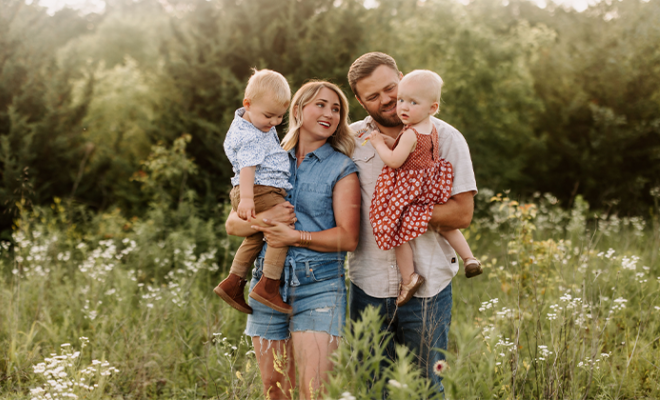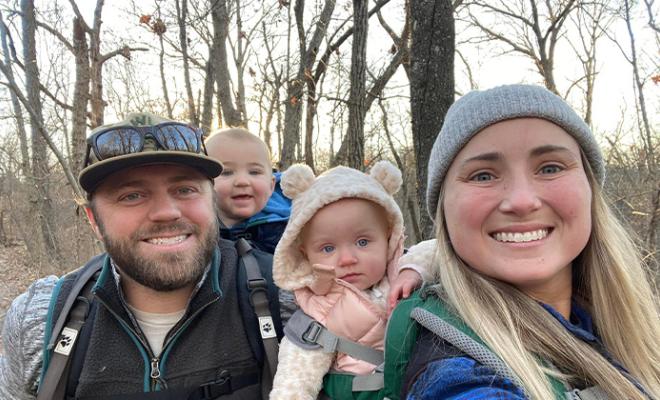I’ve been a sleepy gal my whole life. If given the option to watch a movie or take a nap, I’ll choose the nap almost every time. I’m very sleep dependent. I don’t operate well if I don’t get good sleep, and I don’t operate — like, at all — if I get no sleep.
I started Trikafta as soon as it became available to me in December 2019. I was one of those CFers who experienced ‘the purge’ shortly after taking my first couple of doses. It was completely life-changing for me. After a few days of being on the drug, I felt like I no longer had CF at all. And then, as a result of taking Trikafta, I found out I was pregnant in March 2020!
Before I became a mom, my biggest fear about having babies was the sleep deprivation we hear so much about, especially during the newborn phase. When I found out I was pregnant (with twins, no less!), that fear became my biggest worry: How would I manage to take care of two babies on little or no sleep?
The only significant symptoms that lingered after Trikafta were my pancreatic insufficiency (I’m still reliant on enzymes) and fatigue. But I figured I’m pregnant with twins. Of course I’m tired!
Fast forward to October 2020. Our healthy twins arrived via an unplanned C-section. Born at 34 weeks and 5 days, they spent two weeks in the NICU to gain weight and develop a little further. Then, the training wheels were taken off and our care team pushed us out the door on two wobbly tires. Good luck!
We balanced as well as we could, but it was hard. Really hard. I felt like a zombie walking through the world. My fears manifested — we were getting barely any sleep. Since our babies were premature, we had to wake them up for feedings every three hours, even if they didn’t wake up on their own. And since they weren’t perfectly synced up on their sleep cycles it meant that we were awake every two or so hours throughout the night, every night.
My husband didn’t have any parental leave offered to him through his employer, so pretty soon I was mostly on my own during the daytime. I was desperate for sleep, but there just wasn’t any opportunity to get it. This was harder than pregnancy.
All this to say, my fatigue was more than justified. Of course I was exhausted. I was taking care of two premature infants with very little help — and in the middle of a global pandemic. If I had been able to think beyond just surviving at that point, I probably would have assumed that, surely, my fatigue would finally go away once we were getting good sleep again.
Four years later and our twins are sleeping (almost) through the night. I’m mostly getting good sleep, but I’m still really tired. Some days I have enough energy, but some days the fatigue is debilitating.
When there’s a clear reason to point to (like having newborns at home) and the need for additional rest is understood and ‘acceptable,’ I’m able to admit that I’m tired and I don’t feel bad about it. But when the reason is more complex and not easily understood, I feel shame about needing more rest than the average person.
I worry that people might think I’m lazy, unmotivated, or self-indulgent. When really, it’s just that my body truly needs the rest to operate at its normal level.
For the past seven years, I’ve worked from home full-time. Most days, I take a midday nap to recharge. Usually, I’m so tired by noon that if I push through and don’t sleep, it feels like my brain is wading through molasses just trying to think, and it’s counterproductive to whatever task I’m trying to do.
I’ve learned over the years that I am much more productive when I allow myself to take a nap instead of fighting it. But, for a long time, I would have a pit in my belly while trying to nap, feeling bad that I was laying down in the middle of the day. Through work with my therapists over the years, I have gotten better about allowing myself the time to rest and to not compound my fatigue by beating myself up over it.
I still don’t do it perfectly, but I’ve gotten a lot better about redirecting my self-talk as I’m lying there trying to fall asleep. Not only does positive self-talk help my body relax more easily, but it improves the way I feel about myself overall. I can literally feel my stomach muscles release the tension when I tell myself, “Morgan, it’s OK that you need a nap right now. You are OK. Just relax and rest.” instead of the inner monologue that goes something like this, “Wow, you are really going to sleep in the middle of the workday? What would people think if they knew? You’re ‘sleeping on the job.’ You’re going to get in trouble.”
To be honest, I don’t really understand why, even five years after starting Trikafta, I’m still so tired. Before Trikafta, I thought my fatigue was a result of my body working overtime just to live — breathing despite thick mucus and chronic infection; trying to keep weight on as I ran miles each day just to keep my lungs clear; doing multiple treatments each day just to be able to breathe. But now? My lungs are clear, my weight is stable, I’m not doing any treatments anymore and I’m still tired.
I think it’s probably a combination of several different things — some that I have control over and some that I don’t. I don’t fully have answers, but I’m trying to be OK with that, and — for now at least — just go with what my body is asking for and being kind to myself in the process.
Interested in sharing your story? The CF Community Blog wants to hear from you.





